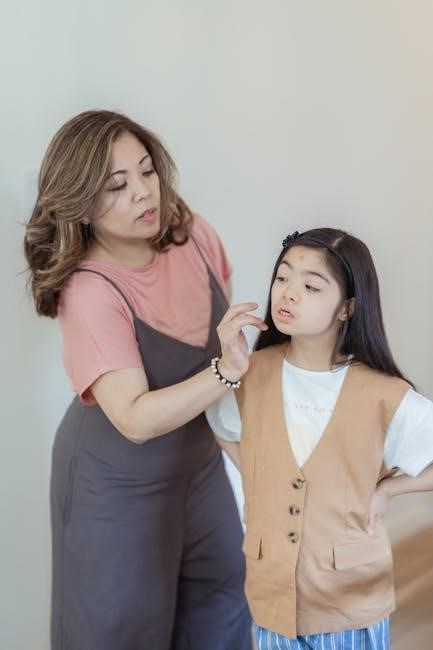Understanding Puberty
Puberty is a natural process where girls experience physical and emotional changes as they transition to adulthood. It includes breast development‚ growth spurts‚ and hormonal shifts‚ marking a significant milestone in their lives.
1.1 Physical Changes in Girls During Puberty
During puberty‚ girls undergo significant physical changes. Breast development often begins first‚ followed by a growth spurt in height and hip width. Menstruation typically starts 1-2 years after breast budding. Body hair appears underarms‚ on legs‚ and in the pubic area. Skin changes‚ such as acne‚ may occur due to hormonal shifts. These changes vary in timing and pace for each girl‚ but they signal the transition to womanhood. Understanding these transformations helps girls feel prepared and reassured about their growing bodies.
- Breast development and growth spurts are early signs.
- Menstruation begins‚ marking a major milestone;
- Body hair and skin changes are common.
1.2 Emotional Changes and How to Cope
Puberty brings emotional changes‚ such as mood swings‚ increased sensitivity‚ and self-consciousness. Girls may feel overwhelmed as they navigate new feelings and social dynamics. Open communication with trusted adults or friends can provide support. Engaging in hobbies‚ practicing mindfulness‚ and maintaining a healthy lifestyle helps manage stress. Building self-awareness and embracing individuality fosters resilience during this transition. It’s important to remind girls that these feelings are normal and temporary‚ encouraging them to seek help when needed;
- Emotional ups and downs are common.
- Open communication is key to coping.
- Self-care and hobbies can ease stress.
1.3 Differences in Puberty Timing Among Girls
Every girl starts puberty at a different time‚ influenced by genetics‚ nutrition‚ and overall health. Some may begin earlier‚ while others develop later‚ and this variation is completely normal. It’s important to understand that there’s no “right” time‚ as everyone grows at their own pace. While some girls might feel self-conscious if they develop sooner or later than peers‚ reassurance and support can help them feel more confident. The timing of puberty doesn’t define a girl’s worth or potential‚ and patience is key during this phase of life.
- Genetics play a major role in puberty timing.
- Every girl’s development schedule is unique.
- Patience and support are essential during this phase.

Hygiene and Self-Care
Proper hygiene and self-care are crucial during puberty. Regular showering‚ skincare routines‚ and managing body hair help maintain confidence and health. Simple practices can make a big difference.
- Shower daily to stay fresh and clean.
- Use gentle skincare products for clear skin.
- Practice good hygiene to boost self-esteem.
2.1 Importance of Personal Hygiene During Puberty
Personal hygiene becomes especially important during puberty due to bodily changes like increased sweating and hormone shifts. These changes can lead to body odor‚ which may cause self-consciousness. Maintaining good hygiene helps girls feel fresh‚ confident‚ and prepared for daily life. Simple practices like showering regularly‚ using deodorant‚ and keeping hair clean can make a significant difference. Proper hygiene also supports overall health by preventing skin issues and infections. By establishing a consistent routine‚ girls can adapt to their changing bodies and feel more comfortable in their own skin. This helps build self-esteem and fosters a positive relationship with their evolving physical selves.
2.2 Skincare Routine for Teenage Girls
A consistent skincare routine is essential for teenage girls to maintain healthy‚ clear skin. Start with gentle cleansing twice daily to remove dirt and oil. Use a mild cleanser suitable for your skin type‚ followed by a toner to balance pH levels. Moisturizing is crucial to keep skin hydrated and prevent dryness. Sunscreen should be applied daily to protect against harmful UV rays. Exfoliating once or twice a week helps remove dead skin cells but avoid over-exfoliating‚ which can irritation. Spot treatments for acne or breakouts can be effective‚ but avoid harsh products. Consistency is key to managing common teenage skin issues like pimples and oily texture‚ helping girls feel confident and comfortable in their skin.
2.3 Managing Body Hair and Hygiene
Managing body hair and hygiene is an important part of growing up. As girls enter puberty‚ they may notice hair growing in new areas‚ such as underarms‚ legs‚ and pubic regions. It’s essential to maintain cleanliness by washing regularly with mild soap and warm water. Shaving‚ using epilators‚ or waxing are common methods to remove unwanted hair‚ but it’s crucial to use clean tools and follow proper hygiene practices to avoid irritation or infections. Remember‚ managing body hair is a personal choice‚ and there’s no right or wrong way to do it. The goal is to feel comfortable and confident in your own skin while maintaining good hygiene habits.

Body Image and Self-Esteem
Building a positive body image is crucial during adolescence. Embrace your uniqueness and focus on self-acceptance. Surround yourself with supportive people who encourage confidence and self-love.
3.1 Building Confidence During Adolescence
Building confidence during adolescence is essential for girls to navigate their changing world. Encourage participation in activities they enjoy‚ fostering a sense of accomplishment. Positive affirmations and support from family and friends can help them embrace their individuality. Celebrate small achievements to reinforce self-belief. Open conversations about body image and self-acceptance can also boost their confidence‚ helping them understand that everyone grows at their own pace. Surrounding themselves with supportive peers and role models further nurtures a positive self-image‚ empowering them to face challenges with resilience and self-assurance.
3.2 Addressing Body Image Issues in Teen Girls
Teen girls often face body image challenges due to societal pressures and unrealistic beauty standards. Foster open conversations about self-acceptance and highlight diversity in beauty. Encourage positive self-talk and remind them that everyone’s body changes uniquely. Provide resources like books or trusted adults to help them navigate these feelings. Promote activities that build confidence‚ such as sports or hobbies‚ to shift focus from appearance to abilities. Addressing body image issues early can help girls develop a healthier relationship with their bodies and reduce long-term self-esteem concerns. Surround them with supportive environments where individuality is celebrated.

Menstruation and Period Management
Menstruation is a natural part of life‚ involving monthly periods. Girls should understand what to expect during their first period and learn proper hygiene practices to stay comfortable and confident.
4.1 What to Expect During Your First Period
Your first period is a significant milestone‚ marking the beginning of menstruation. It may start with light spotting or heavier flow‚ typically lasting 3-7 days. Emotional and physical changes‚ like cramps or mood swings‚ are common. Hygiene is crucial—use sanitary pads or tampons to manage flow and change them regularly. Some girls feel nervous‚ but understanding the process helps ease anxiety. It’s normal for periods to be irregular at first‚ but if concerns arise‚ consulting a trusted adult or healthcare provider is recommended. This natural process is a part of growing up‚ and being prepared ensures confidence and comfort.
4.2 Tips for Managing Menstrual Hygiene
Proper menstrual hygiene is essential for health and confidence. Use sanitary pads or tampons‚ changing them every 4-8 hours to prevent odor and infection. Always wash hands before handling menstrual products. Carry extra supplies in a bag for emergencies. Shower daily and wear clean underwear to maintain freshness. Avoid using scented products‚ as they can irritate the skin. Dispose of used products correctly to ensure hygiene. If using tampons‚ choose the right absorbency and avoid leaving them in for too long. Staying organized and prepared helps manage menstruation discreetly and effectively. Understanding these practices fosters a healthy and positive approach to periods.

Relationships and Communication
Building healthy friendships‚ open communication with parents‚ and understanding crushes are key aspects of navigating relationships during puberty. These interactions shape emotional growth and social confidence.
5.1 Building Healthy Friendships
Building healthy friendships during puberty is crucial for emotional support and social growth. Girls often seek close relationships to share experiences and feelings. Trust‚ respect‚ and empathy form the foundation of strong friendships. Open communication helps navigate challenges like body changes and emotional shifts. Encouraging kindness‚ inclusivity‚ and loyalty fosters meaningful connections. Surrounding oneself with positive influences can boost confidence and self-esteem. Healthy friendships provide a sense of belonging and help girls develop essential social skills. By being supportive and understanding‚ girls can build lasting friendships that aid in personal growth and resilience during adolescence.
5.2 Communicating with Parents About Changes
Open and honest communication with parents is essential during puberty. Girls may feel nervous discussing bodily changes‚ but parents can provide guidance and reassurance. Encouraging open dialogue helps build trust and understanding. Active listening and empathy from parents foster a supportive environment. Girls should feel comfortable asking questions about their development‚ and parents should be patient and informed. This mutual respect strengthens the parent-child relationship and helps girls navigate emotional and physical transitions confidently. Regular conversations can address concerns and provide practical advice‚ ensuring girls feel supported throughout their growth journey.
5.3 Understanding Crushes and Attractions
Crushes and attractions are natural feelings that often arise during puberty. Girls may experience strong emotions toward others‚ which can feel exciting but also confusing. These feelings help shape self-identity and relationships. It’s important to understand that attraction can vary and may change over time. Open conversations with trusted friends or family can provide clarity and reassurance. Respecting personal boundaries and others’ feelings is key. Crushes are a normal part of growing up and help girls learn about themselves and relationships. Embracing these emotions with confidence and self-awareness fosters healthy social and emotional development during adolescence.
Growing up is a journey of self-discovery and empowerment. With the right support‚ girls can navigate changes confidently‚ fostering resilience and embracing their unique individuality.
6.1 Key Takeaways for Girls Growing Up
Embracing puberty with confidence and positivity is key to a smooth transition. Girls should understand that every body changes at its own pace‚ and diversity is normal. Self-acceptance and self-care are vital for both physical and emotional well-being. Building a strong support system‚ including friends‚ family‚ and trusted adults‚ can provide guidance and reassurance. Open communication about feelings and concerns helps navigate challenges effectively. Remember‚ growing up is a journey of self-discovery and empowerment‚ where every girl can thrive by staying informed‚ confident‚ and true to herself.
6.2 The Importance of Support Systems
A strong support system is essential for girls navigating puberty and adolescence. Family‚ friends‚ and mentors provide emotional backing‚ helping girls feel secure and understood. Open communication with trusted adults fosters guidance and reassurance during challenging times. Peer support from friends can ease feelings of isolation‚ while positive role models inspire confidence and resilience. Building and maintaining these connections helps girls develop coping strategies and a healthy self-image. A supportive network not only aids in addressing immediate concerns but also empowers girls to make informed decisions and thrive as they grow. Surrounding themselves with loving‚ understanding individuals is crucial for their overall well-being and happiness.

